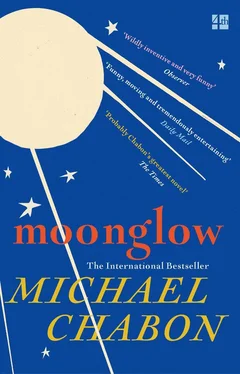“Your neighbor,” my grandfather said.
The lighter grew hot against his skin and he snapped it shut. Retinal fire swam across the darkness. Then his eyes adjusted, and he found that he could see. Dawn was an abrupt business in Florida; in another ten minutes or so it would be morning.
“Mrs. Winocur claims to have seen it. She calls it Alastair,” said the woman. My grandfather heard her introduce herself as Sally Seashell; later the last name turned out to be Sichel. “But do you think it’s really out there?”
“Something’s there,” my grandfather said, never one to give false comfort. He thought Phyllis Winocur was full of shit, but he doubted that the cats and lapdogs of Fontana Village were vanishing voluntarily into the swamp in a bid for freedom, banding together out there like four-legged Seminoles. “How’d he get out?”
“My fault,” she said, “I was dumb. I took pity on him. Back home he used to range so freely. He and I haven’t been here long.”
“Where’s home?”
“Philly.”
It crossed my grandfather’s mind to observe that Philly could be tough on cats, too, but then he would have to explain. It had been a long time since he had attempted to explain himself to a woman. It felt like an insurmountable task.
“What part?” he said.
“Bryn Mawr.”
“Bryn Mawr ain’t Philly.”
“Aha,” she said. “Yes, I can hear it in your voice.”
As it grew lighter, my grandfather came to see that Sally Sichel was a good-looking woman, tall, slender, but full-breasted. Dark complexion, long nose with a bump, a touch of Katharine Hepburn in the cheekbones. Maybe a couple of years younger than he was, maybe not. She wore a pair of men’s pajamas, the kind that buttoned up the front, and duck boots coated in rubber the color of a New York taxi. She had not troubled to lace them up very well.
“Does he usually come when you call him?”
“Always.”
“How long has he been gone?”
“All night.”
“Hmm.”
“I probably shouldn’t say this,” Sally Sichel said. “We just met. But that piece-of-shit cat is more or less my only reason for living.”
My grandfather fought against an overwhelming impulse to say something along the lines of In that case, maybe you ought not to have let him out of your house to be eaten by a half-ton reptile or For Christ’s sake, lady, it’s just a motherfucking cat . He revised downward the favorable impression he had begun to form of her, an impression shot through with a surprising vein of lust; it had been a very long time. Anyway, you had to have reservations about somebody who walked around with her shoes untied.
“I know what you’re thinking,” she said. “He was only a cat.”
“Not at all.”
“It’s just, I lost my husband very recently. And Ramon was really his cat.”
“I see.”
“They were very close.”
“I understand,” my grandfather said. “I lost my wife.”
“Recently?”
“Fourteen years.”
“Oh. Well, I’m sorry.”
Sally Sichel started to cry. Standing there in her pajamas, arms crossed under her commendable breasts. Looking out at the Jungle that had taken her husband’s cat, the architecture of her cheeks glazed with tears. Her nose began to run. My grandfather took a chamois, which he used to wipe his camera lenses, out of the back pocket of his shorts and passed it to her.
“Oh,” she said, blowing her nose into the chamois. He remembered—as much in his loins as in his head or heart—the circus girl who had spread her legs for him in the cottage at Greenwich Yard, Creasey’s bloody chamois clutched in her hand. “What a gentleman. Thank you.”
He knew that it would also be gentlemanly to put a consolatory arm around Sally Sichel’s shoulder. Not just gentlemanly; it would be humane. But he was afraid of what might happen down the line. A widow and a widower, easing each other’s passage from grief to passion in the autumn of their lives: The very triteness of it seemed to ensure its likelihood.
From the time he’d moved to Florida in the mid-Seventies, the available women of Fontana Village had been giving my grandfather their best shot. While he turned out the beautiful and high-priced scale models that NASA and private collectors had commissioned, and explored the labyrinth of LAV One as it grew in intricacy and size on the dining room table, the available women of Fontana Village came to make their case. They sent scouts and embassies, plates of cookies and brownies and blondies, pots of soup, potato latkes at Hanukkah, cards, knit goods, pies, poems, oil paintings, cuts of meat, bottles of wine, and a dish of macaroni and cheese. I happened to be visiting when the macaroni and cheese showed up, and I thought it made a pretty strong case for its author, who had followed a recipe adapted from Horn & Hardart’s.
As he’d been licking his fork, awash in memories of the Broad Street Automat, I’d thought my grandfather had looked more contented than I’d seen him in a long time. When the dish was empty, however, he had washed it out and dried it, dropped in a thank-you note scrawled on a scrap of legal paper, and left it on the woman’s back patio at a moment when he knew she would be out. On a few occasions he had been cornered by some available and exceptionally persistent woman of Fontana Village, and just to get a little peace he had accepted her dinner invitation. More intimate invitations, some tempting, some issued with a frankness he could not help but admire, he had declined.
It was not that he wanted to be celibate. He got ideas. He missed the contact, the skin-on-skin warmth of it. The property manager of Fontana Village, Karen Radwin, had a way of touching your arm or your shoulder when she spoke to you, sometimes he would feel a jolt of current. And yet apart from one night in Cocoa Beach, Florida, in April 1975, my grandfather had kept his hands to himself since my grandmother’s death.
You could say this or you could say that about the why or why not of it, but in the end it came down to this: He didn’t feel like talking. He didn’t feel like explaining himself. My grandmother used to complain sometimes about his silences, but only when there were other people around, when people started in with the banter and the repartee and the opinions on Agnew or Sondheim, as if she were embarrassed for his sake because his silence might be taken for disapproval or thickheadedness. Don’t worry about him , she would say, that’s how he is—every time we start an argument I end up with a monologue. Or Some husbands take lovers, mine he take the Fifth. Then she might put a hand on his knee and insist, reassuring herself maybe as much as whomever they were with at the time, But he is listening. After they had been married fifteen years—around the time I came into the picture—there was nothing he could tell her that she didn’t already know. That was all he wanted: to be known.
He did not put his arm around Sally Sichel. He kept it where it belonged, by his side. Just to make sure, he transferred the socket wrench over to that hand as ballast.
Sally Sichel went to the low rail, put her hands to her mouth, and screamed, “RAMOOOOOOOON!” A yellow bird hiding in the brush nearby startled and took wing. She held the ragged note of the O. Lights came on in the units that overlooked the Jungle; calls were placed to the security office. My grandfather had not heard a woman scream that way— holler might be a more accurate characterization—for a very long time. Sally Sichel hollered for Ramon in precisely the way that a peeved older sister would holler from a stoop on Shunk Street when sent out to call her jackass brother home for supper. After the echo died away, Sally Sichel lowered her hands, stepped back from the wooden rail, and turned to my grandfather. She looked a little sheepish, but not very. With the coming of daylight, he could see the marks of care on her face, the shadows under her eyes, a tautness around her mouth as if she had bitten in to something mealy. A fine-looking woman, all the same.
Читать дальше












